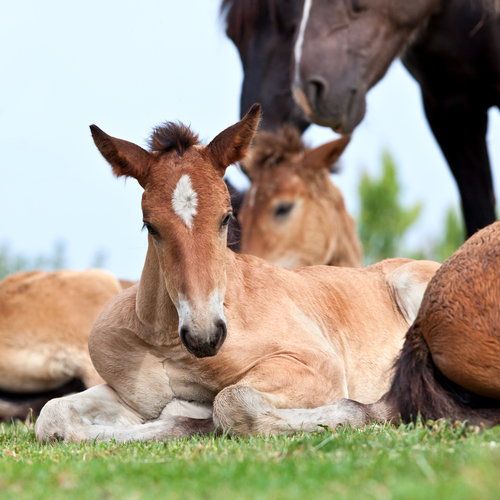Maintaining your new foal as it grows can be both fun and challenging. Foals change drastically during their first months as they become weanlings and mature. Weanlings and yearlings continue to build bone and muscle and mass at a remarkable rate. From weaning to two years of age, the horse may nearly double its weight again.

Meeting your growing foal's needs
The reward for providing excellent nutrition, conscientious care and a safe environment will be a healthy foal that grows into a sound and useful adult horse.
Weanlings and yearlings benefit from a diet containing 14 to 16 percent protein. They also require readily available sources of energy to meet the demands of growth and activity. The percent of concentrates or roughage a diet may contain depends on the desired growth rate. However, the diet should never contain less that 30 percent as roughage measured by weight.
A good rule of thumb is to provide 60 to 70 percent of the ration as concentrates and 30 to 40 percent of the ration as roughage, measured by weight. The diet must also provide ample fiber to keep the digestive tract functioning properly. Some of the new "complete feeds" have the ration already balanced.
Weight gain and development taper off as the horse matures. As growth slows, you will need to adjust the ration to approximately 1.5 to two percent of the yearling's body weight. The grain to roughage ratio should also be adjusted so by the time the horse is a 2-year-old, half of its daily diet (by weight) is coming from grain sources and the other half from hay and pasture. Breed type, maturity, desired growth rate and condition and level of activity will affect the horse's exact nutritional requirements.
Work with your veterinarian to develop a total health care plan for your foals, weanlings and yearlings. A regular deworming, vaccination and examination schedule is essential to ensure your foal is getting the care it needs. Remember, vaccination and deworming regimens may vary depending on regional factors and disease risks.
Management tips for foals, weanlings, and yearlings:
- Unless there is a medical concern, provide youngsters free choice exercise daily.
- The less time foals are confined to stalls, the better. Avoid confining foals for more than 10 hours per day.
- Use longeing, round pen or treadmill work judiciously. Excessive forced exercise can strain joints and limbs.
- Never exercise a foal to the point of fatigue. If you observe a foal’s limbs to be shaking, weak, or if the mare cannot keep up with the adult horses in a herd, the mare and foal need to be confined until the foal is rested.
- Keep your youngster's feet properly trimmed to foster proper bone development.
- Provide a clean, safe environment with adequate shelter from the elements.
- Check the horse's surroundings and eliminate any potential hazards such as loose boards, nails, wire fencing or equipment.
The reward for providing excellent nutrition, conscientious care and a safe environment will be a healthy foal that grows into a sound and useful adult horse.
Learn more about Caring for Your Foal
